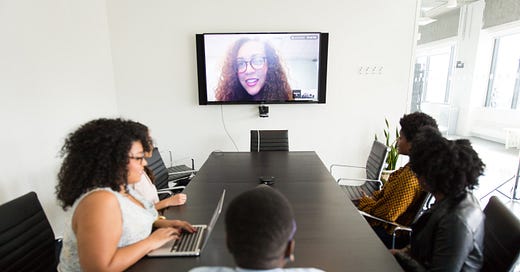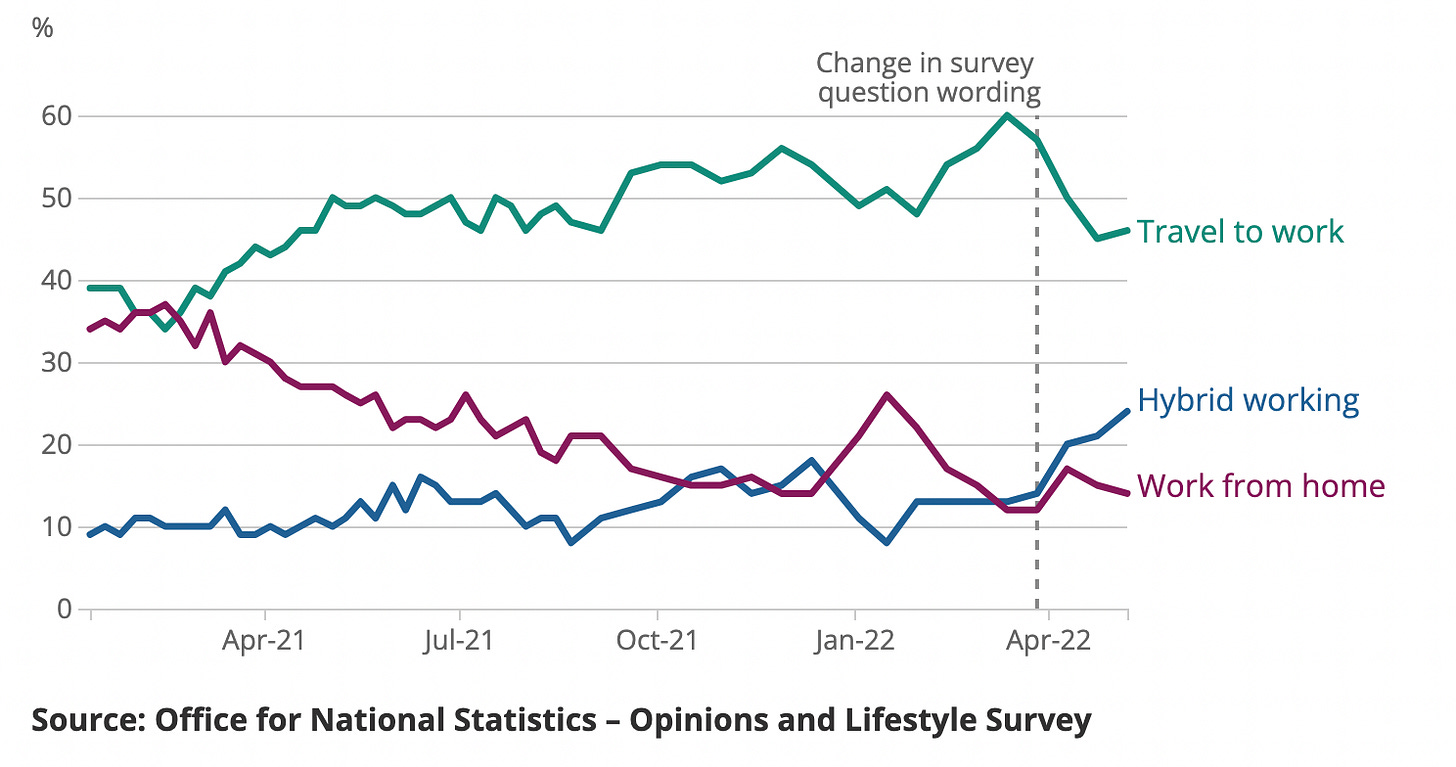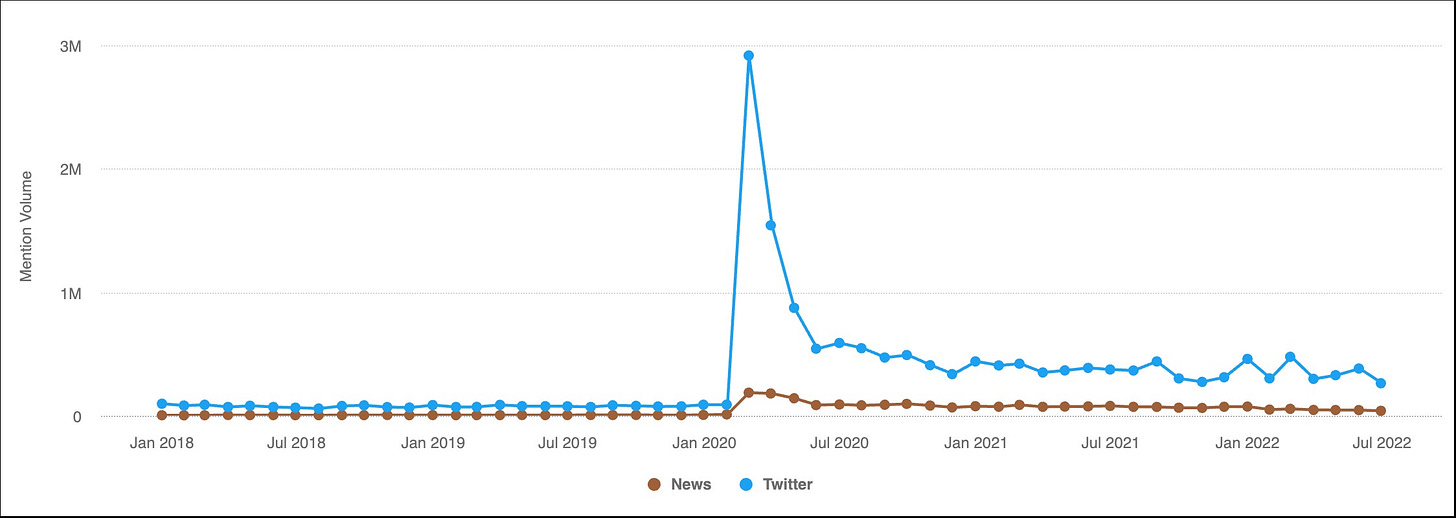Make hybrid working great (again)
We're only a small fraction of the way into the great social experiment that is post-pandemic agency life. But unless we improve it quickly, we risk alientating employees.
Hybrid working doesn't work. That's my experience mixing days WFH with days in the office over the past 12 months. Or at least, it doesn't work most of the time. Last week, I had a day in the office where all but one of my meetings were entirely face-to-face. The only Teams call I joined was with a client based in Northern Ireland - and I had the benefit of physically being with the other Teneo participant. It was absolute bliss.
Going into the office to sit on hours of video calls is completely pointless - and also quite hard work because the office WiFi often gets overloaded and falls over. Hybrid meetings, with some participants virtual and others physical, are OK at best. The mechanics still feel clunky - you're regularly aware of the limitations of the tech.
The idea of hybrid working makes sense on paper but, in practice, leaves a lot to be desired. The challenge is that, for those of us working in agencies, in particular, neither end of the office work spectrum particularly appeals. Very few people who can work from home want to go back into the office five days a week.
Besides, it's worth remembering that this cohort of people who can WFH is a minority in the UK - 38% of people are either fully remote (14%) or hybrid working (24%) based on the latest ONS statistics. 46% of workers in the UK travel to a physical workplace "exclusively".
Like the idea of hybrid working, the idea of a fully remote position makes logical sense. It removes travel costs and time and increases the potential for a better work/life balance. But again, like hybrid working, the practice of being fully remote often differs from the theory. Many people reported an increased blurring between work and life boundaries when working fully remotely - they found it hard to switch off at the end of the day and often lacked physical and mental distance from their work. Not everyone has the luxury of a home office space they can leave at the end of the day. At Teneo, we also found that our agency culture suffered during periods of enforced working from home. From speaking to other senior agency folks, I know this is a trend across London agency land.
Humans are naturally social creatures - our primal urge to be part of a tribe (or tribes) continues to burn bright after thousands of years. Digital connections are a poor replacement for physical interactions - the pandemic showed us just how poor a replacement they are. But these emotional needs are at odds with the physical practicalities of commuting. Travelling into a workplace takes time and money - two of the scarcest resources in 2022.
This tension and the lack of options for improving hybrid working mean we can't stop talking about the future of office work. Any time I get a client brief that wants to explore the "future of work", I die a little inside. But then I casually browse the various blogs and news sites I read and see the consistent (although technically slowly dwindling - see graph below) levels of coverage the topic gets. I understand why people still want to talk about it.
We still want to talk about the hybrid working because it's totally boring and endlessly fascinating all at once. Part of that reason is a natural curiosity and restlessness - if we know something isn't working, we're constantly looking for alternatives. There's a persistent feeling that they're must be a better way. So we look at other companies and read every article desperately in search of some nugget that will inspire something new we can try. That search is mostly in vain - most office-based companies try variations of the same things. Relaxed virtual get-togethers, anchor days, shorter office hours - tinkering at the edges of what we currently have available.
For me, these discussions are also a great source of emotional reassurance. Reassurance that no one else has cracked the conundrum and that while hybrid working is far from perfect, we're making the best of the situation. As another agency COO told me recently, "we're barely even 5% into this new working experiment. There's so much more testing and trialling to do before we crack it". We can't underestimate good old-fashioned empathy and understanding.
This search for empathy and reassurance is also at the root of why any person or business who dares to suggest that remote/hybrid working is anything less than the future receives immediate notoriety and then pariah status. The latest person to receive such opprobrium was Malcolm Gladwell - a distinct change from Morgan Stanley-type business leaders who've waded into these debates before.
Speaking on the Diary of a CEO podcast (I mean, what is Malcolm Gladwell the CEO of?), he said: "It's not in your best interest to work at home. I know it's a hassle to come into the office, but if you're just sitting in your pyjamas in your bedroom, is that the work-life you want to live?" I've seen a bunch of reactions across LinkedIn decrying this perception, and rightly so. The notion that WFH equals laziness and lack of care is pre-pandemic thinking. Anyone who lived through 2020-21 at home knows there are plenty of ways that WFH is way more productive, and working in your pyjamas or leisure wear is preferable for many people. What you wear doesn't affect how you work.
Gladwell misjudged the pyjama comment, but I think he does have a point to make underneath the rank hypocrisy Vice pointed out. In this same section of the interview, he also said: "It's really hard to explain this core psychological truth, which is we want you to have a feeling of belonging and to feel necessary. If we don't feel like we're part of something important, what's the point?" This point has more resonance for me, given that one area we struggled with, as did other agencies, during enforced periods of working from home was around culture and connection. Moving from a highly collaborative environment built on chance interactions and face-to-face meetings to an entirely virtual world fundamentally changed people's relationships with their workplace, colleagues, and even their career. It triggered many people to completely rethink their relationship with the world of work; hence we have the Great Resignation.
Gladwell recognises this disconnection people felt, and potentially still feel, from their employer due to enforced time away from offices and workplaces. But he also misunderstands where the onus sits for encouraging people to rediscover feelings of belonging. It's not on employees to do this; it's on senior management and senior leaders to make people WANT to spend more time in the office. Particularly during a cost of living crisis, travel becomes a potentially significant area of saving. If agencies want people close to each other physically, they need to work hard at encouraging this behaviour.
And based on current data, we need to work harder - according to the same ONS study, the youngest and the oldest ends of the spectrum spend the most time in the office. It's in the middle that the challenge lies. People with different life priorities, with more work/life balance difficulties, with less need for the kind of on-the-job training that's invaluable when you're a junior.
The social aspect of working life is an effective driver of office attendance - our busiest days have been those with a significant event in the evening, whether a party or a quiz. And the office feels different on those days. It feels a bit like pre-pandemic times - bustling with excitement. Now, that's probably just excitement around the evening entertainment, but it's a good feeling and one we should strive for more regularly.
And the key to that is making hybrid work better and making the time spent in the office worth the cost of people's time and money. Because there's a whole range of different studies that show the benefits of physically working together to solve problems and come up with killer creative ideas. We need to help people get the balance right so they spend more time in the office physically interacting with each other and less time stuck on slightly awkward hybrid video calls. We’ve got plenty of good ideas on trial at the moment, but I’m going to continue reading and interacting with discussion on the topic, because there’s always the potential for something new out there. We need more sharing of what’s working with hybrid work, and less sweeping, Gladwell-esque judgements to move this experiment forward.





Yoooooo! My take on Gladwell’s comment is that he was trying to say something like…WFH is supposed to give you a better work/life balance, right…but if you’re not getting that because you’re forced into work as soon as you wake up (without having time to get dressed, let alone do anything else) as your diary is now back to back to back with meetings because no-one can now just wander across the office and say, “hey, quick question for you” (which is normally not true on three counts)…where’s the work/life balance in that? So, maybe better to force the distinction and mental separation between home and work by physically travelling somewhere and then having more meaningful/productive balance. I agree with the COO’s point though, barely 5% into this sitch…so gotta keep up with the empathy and adjustments.
PS. Go easy on Gladwell bro…he ain’t Jacob Rees-Mogg after all.
PPS. You should bring back the KP-style blonde streak from the late 90’s.
PPPS. Love ya.